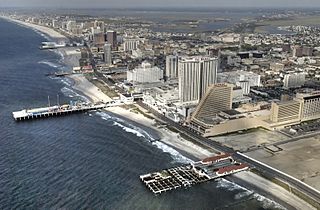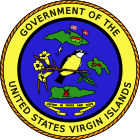
The United States Virgin Islands, officially the Virgin Islands of the United States, are a group of Caribbean islands and an unincorporated and organized territory of the United States. The islands are geographically part of the Virgin Islands archipelago and are located in the Leeward Islands of the Lesser Antilles.

The Danish West Indies or Danish Virgin Islands or Danish Antilles were a Danish colony in the Caribbean, consisting of the islands of Saint Thomas with 32 square miles (83 km2); Saint John with 19 square miles (49 km2); and Saint Croix with 84 square miles (220 km2). The islands have belonged to the United States as the Virgin Islands since they were purchased in 1917. Water Island was part of the Danish West Indies until 1905, when the Danish state sold it to the East Asiatic Company, a private shipping company.
Saint Croix is an island in the Caribbean Sea, and a county and constituent district of the United States Virgin Islands (USVI), an unincorporated territory of the United States.

The United States Virgin Islands, often abbreviated USVI, are a group of islands and cays located in the Lesser Antilles of the Eastern Caribbean, consisting of three main islands and fifty smaller islets and cays. Like many of their Caribbean neighbors, the history of the islands is characterized by native Amerindian settlement, European colonization, and the Atlantic slave trade.

In the United States, gambling is subject to a variety of legal restrictions. In 2008, gambling activities generated gross revenues of $92.27 billion in the United States.

A referendum on the sale of the Danish West Indian Islands to the United States of America was held in Denmark on 14 December 1916. The non-binding referendum saw 283,670 vote in favor of the sale of the Danish West Indian Islands and 158,157 against. The residents of the islands were not allowed to vote on the matter, but in an unofficial vote on Saint Croix arranged by David Hamilton Jackson, 4,027 voted in favor of the sale and only seven voted against. As a result of the referendum the islands were formally relinquished to the United States by the Treaty of the Danish West Indies on 31 March 1917 as the United States Virgin Islands for a sum of US$25,000,000 in gold.
Referendums in Taiwan at both the national and local level are governed by the Referendum Act of Taiwan, which was enacted by the Legislative Yuan in December 2003. Citizens can propose laws via referendums at the national and local levels. The Referendum Act also allowed people to make changes or abolish laws by referendums.
Stateside Virgin Islanders are West Indian Americans who hold US citizenship and who have migrated from the U.S. Virgin Islands to the continental United States and Hawaii, and their descendants.
Indiana law authorizes ten land-based or riverboat casinos on Lake Michigan and the Ohio River, one land-based casino in French Lick, and racinos at the state's two horse tracks. In addition, there is one Indian casino in the state. Other forms of legal gambling are the Hoosier Lottery, parimutuel wagering on horse races, and sports betting.

Gambling in New Jersey includes casino gambling in Atlantic City, the New Jersey Lottery, horse racing, off-track betting, charity gambling, amusement games, and social gambling. New Jersey's gambling laws are among the least restrictive in the United States. In 2013, the state began to allow in-state online gambling. Five years later, the state won a lawsuit that dismantled Nevada's monopoly on legal sports betting.
A referendum on legalising casinos and slot machines was held in Guam on 16 April 1977, alongside elections to a Constitutional Convention and the Board of Education.

A referendum on allowing casino gambling was held in the United States Virgin Islands on 3 November 1992. The result was binding only if a majority of registered voters participated. The proposal was rejected by a wide margin, but was later approved in a 1994 referendum.

Gambling in Taiwan is prohibited by the Criminal Code of the Republic of China. State-run lotteries, like the Uniform Invoice lottery, are the only legal form of gambling on mainland Taiwan. The construction of casinos on some off-shore islands was legalized in 2009, though to date none have been built. Some gambling-style games are allowed either on special days or under special restricted circumstances.
Same-sex marriage has been legal in the United States Virgin Islands since July 9, 2015, as a result of the U.S. Supreme Court's decision in Obergefell v. Hodges. On June 26, 2015, the Supreme Court ruled that same-sex couples have a constitutional right to marry under the Equal Protection and Due Process clauses of the Fourteenth Amendment, legalizing same-sex marriage in the U.S. Virgin Islands. On June 30, Governor Kenneth Mapp said the territorial government would comply with the ruling, and on July 9 he signed an executive order that requires the government to extend marriage rights to same-sex couples. The first marriage licenses were granted on July 21, 2015, after the first same-sex couples to apply for licenses did so on July 13, beginning the 8-day waiting period between applying for and receiving marriage licenses.

Cannabis on American Indian reservations historically largely fell under the same regulations as cannabis nationwide in the United States. However, the August 2013 issuance of the Cole Memorandum opened discussion on tribal sovereignty as pertains to cannabis legalization, which was further explored as the states of Washington and Colorado legalized marijuana. A clarifying memo in December 2014 stated that the federal government's non-interference policies that applied to the 50 states, would also apply to the 326 recognized American Indian reservations. U.S. Attorney for Oregon, Amanda Marshall, stated that the clarification had been issued in response to legal questions from tribal nations, but that only three unnamed tribes, in California, Washington state, and "the Midwest" had stated explicit interest in legalizing.

Cannabis in the United States Virgin Islands is legal for recreational use since January 18, 2023, under territorial law. Legislation to legalize was passed by the territorial legislature in 2022, and was signed into law on January 18. Medical use was legalized in 2019 through a bill that passed the Senate 9–4. It remains illegal under federal law.

A referendum on amending the electoral system for the Legislature was held in the United States Virgin Islands on March 30, 2019. Although the proposal was approved by 75% of voters, voter turnout was below 10%, invaliding the result.
The United States Virgin Islands are a group of around 90 islands, islets, and cays in the Caribbean region in which inhabitants were claimed by Spain in 1493. No permanent settlements occurred in the Spanish period and the islands were colonized by Denmark in 1671. The inhabitants remained Danish nationals until 1917. From that date, islanders have derived their nationality from the United States. Nationality is the legal means in which inhabitants acquire formal membership in a nation without regard to its governance type. In addition to being United States' nationals, Virgin Islanders are both citizens of the United States and [local] citizens of the Virgin Islands. Citizenship is the relationship between the government and the governed, the rights and obligations that each owes the other, once one has become a member of a nation.









